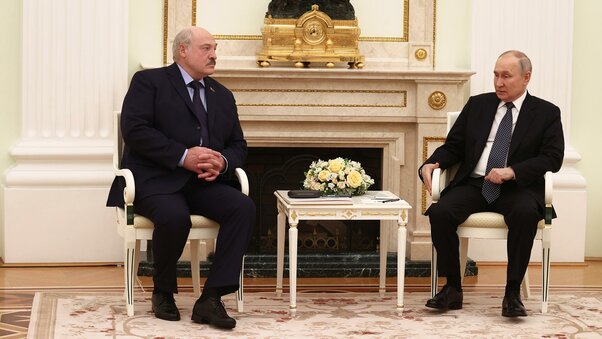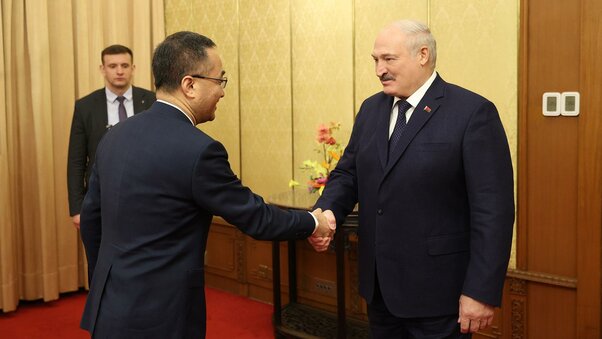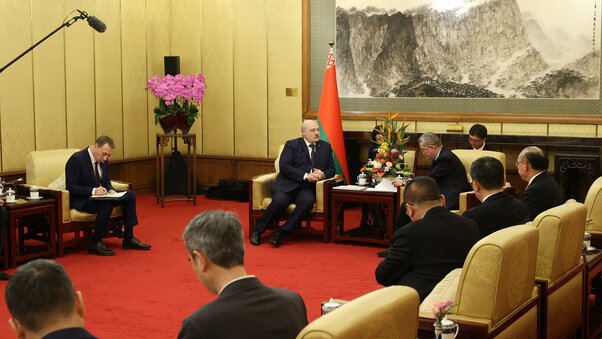Session of Supreme State Council of Union State
- 17
- 15:08
Belarusian President Aleksandr Lukashenko took part in the session of the Supreme State Council of the Union State of Belarus and Russia on 6 April.
As the Belarusian President arrived in the Kremlin, he told reporters that Vladimir Putin and he took decisions on all the talking points during their negotiations on the eve of the meeting.
The talks lasted for more than six hours. The heads of state discussed the matters that were outside the agenda of the Supreme State Council meeting.
Aleksandr Lukashenko mentioned the outcomes of the talks another time at the beginning of the Supreme State Council meeting. “Dear friends, you know that Vladimir Vladimirovich and I held very important talks yesterday. We discussed some sensitive matters, as journalists say. There are always matters like this. We paid more attention to security issues, the development of the military industry and the defense of the Union State,” he said.
“Those negotiations were fruitful. We came to terms on all issues, and there were more than a dozen of them. Of course, we cannot go into detail. But I believe that you will hear and see everything in the near future,” Aleksandr Lukashenko said.
“As far as the Supreme State Council meeting is concerned, it is more focused on social and economic matters,” the head of state added.
“Taking into account current circumstances, it is difficult to overestimate the significance of this unique interstate association. Judging from the combination of results accomplished over such a brief period our union is rightfully a leader among other integration associations,” Aleksandr Lukashenko said.
This is why it is not surprising that many achievements secured within the framework of the Union State of Belarus and Russia were borrowed by adjoining integration associations in the CIS space.
Aleksandr Lukashenko said: “As never before, today it is important for us to fully realize provisions of the treaty on establishing the commonwealth of Belarus and Russia, which was signed during these April days 27 years ago in 1996. This fundamental document became a starting point for further advancement of bilateral relations. And you may remember that I signed the treaty on our union and on the construction of the Union State with Vladimir Vladimirovich [Putin] already.”
The Belarusian leader noted that by persistently expanding the legal base of interaction, Belarus and Russia have opened up broad thoroughfares for invigorating business, cooperation of scientific circles and art collectives, partnership of youth associations. Freedom of movement of citizens and capital, equal opportunities for education and labor are seen as undeniable advantages of integration by ordinary Belarusians and Russians. Aleksandr Lukashenko said: “I mention that because people often tend to forget about it and believe it is only natural. They forget that no country enjoys in its relations as much as Russia and Belarus have. We freely travel, our people can choose the place to work, and all the relevant matters have been addressed.”
“The number of trade transactions is a marker of the success of our economic cooperation. Over the past 27 years trade has increased by more than four and a half times. Industrial cooperation is a key area in bilateral relations. Today it is the ties between more than 8,000 Belarusian and Russian enterprises, hundreds of thousands of jobs,” Aleksandr Lukashenko said.
During the years of its existence the Union State has implemented more than 60 joint scientific and technical programs in various areas, including space exploration, information technologies, agriculture, production of materials and devices.
Aleksandr Lukashenko also mentioned the development of cooperation between young scientists of the two countries. Addressing the Russian president, he said: “Young people have held a meeting. I mean what you told me in Minsk. Young scientists have outlined a program of further development. They have started with the student who once posed a question to you. You called to say that we need to move in this direction. We held a meeting of young scientists at the Academy of Sciences, and found a number of important points of contact for the future work.”
“Many developments are successfully put into production, thus contributing to the implementation of the import substitution program and reducing dependence on Western technologies,” the head of state said.
Aleksandr Lukashenko recalled that earlier he had discussed with Vladimir Putin an important issue of import substitution in microelectronics. The presidents revisited the matter during the talks in the Kremlin on 5 April. The president emphasized that he had recently studied this topic in detail during his visit to the Planar company in Minsk. The company’s specialists assured that aircraft and rockets would fly as they did - Belarus has all necessary technologies and capabilities for that.
“We’ve found a way out even in this complicated matter. And in many other ones. This is why we will endure. It is different from creating a vehicle or a tractor. [Microelectronic] products are complicated things. We’ve learned how to make them, we have the competences. The Soviet Union did all of that. [During the post-Soviet period] we simply relied on the West. Now we recognize they are no friends of ours. We have to make these products ourselves,” he remarked.
According to Aleksandr Lukashenko, Belarus and Russia have created an effective defense and security system that includes a regional group of forces and a unified air defense system. The measures to strengthen border security helped significantly increase the level of protection of the Union State from international terrorism, uncontrolled migration, arms and ammunition smuggling, drug trafficking, and illegal economic activity.
“Yesterday I told the president [of Russia] that a great amount of weapons from Ukraine is flooding into Russia as well as into Belarus through Russia. Our border with Ukraine is sealed. Weapons went through Bryansk Oblast and other regions. Together with Alexander Vasilievich Bortnikov [Director of the Federal Security Service of Russia] we have completed the operation today. We will inform the public about it in the near future. You know, we detained this terrorist who entered the territory of Belarus and was heading to another country through Russia,” the head of state said.
According to the president, the KGB and the FSB carried out a joint operation. “We have tracked down the whole network. The Russians are finishing their part of the work here, in Russia, and are working on some other things. So they won’t leave us alone. There are caches - in Belarus and in Russia – containing weapons and explosives. They come and take it. That was how it happened in St. Petersburg [the explosion in a cafe that killed blogger and war correspondent Vladlen Tatarsky]. Most likely, no one transports ammunition and explosives in their pockets across the border. There are caches here. And we have detected several of them in our country. Therefore, we discussed these matters in great detail yesterday. I think we will pull through,” Aleksandr Lukashenko emphasized.
In his words, the countries conduct a coordinated foreign policy in the international arena. “Our cooperation in the area of foreign policy is an example for others,” Aleksandr Lukashenko stressed.
Aleksandr Lukashenko reiterated the need for a media holding in the Union State as he spoke at a meeting of the Supreme State Council of the Union State.
“Media resources - we also have experts discussing this topic. Vladimir Vladimirovich [Putin] and I agreed back in St. Petersburg that we needed a large-scale media holding in the Union State. We need to set up this media holding company,” the president said.
“Yes, it may not be cheap to some extent. But if we want a good coverage of our agenda (we have a lot to talk about), we need to set up this media holding without affiliating it to any organizations. This is what we have agreed on. This is, however, a project that cannot be implemented right away. We need certain funds for it,” the Belarusian leader added.
“In what concerns information confrontation and the formation of a strong ideological support for our Union State construction, a lot has been done by our citizens. We have no right to lose the battle for the minds and hearts of our people on the printed, TV, radio and digital battlefields,” the Belarusian leader said.
“The ideological confrontation between East and West will not weaken even after the guns fall silent. It is to stay that way for a long time,” the Belarusian president said.
“You are aware of the situation around our countries. It is not easy. Without a doubt, we have tackled with dignity the first round of massive external economic attacks. Much has been said about this,” Aleksandr Lukashenko noted.
The head of state cited import substitution as an example. He mentioned the production of machinery and equipment for the construction and maintenance of railways in Russia. “After the West left, they learned how to do it on their own,” the president noted.
According to the head of state, the failed attempts at an economic blockade were followed by military blackmail in the form of a consistent build-up of NATO forces and means near the Union State border, especially around Kaliningrad Oblast. “The economic blockade was doomed to fail. They sought to do it at a gallop. Had they thought about it thoroughly, they would not have started it, because our economies are self-sufficient. When they realized that they could not subdue us using economic means, they resorted to military pressure. The talks about a possibility of a global armed conflict are becoming more widespread,” Aleksandr Lukashenko said.
He emphasized that in the context of the political, economic and information warfare unleashed against Belarus and Russia and against the backdrop of the international law crisis and the apparent inaction of international institutions, Belarus and Russia need to defend and promote national interests in an even more coordinated and efficient manner. “In my Address, I openly and directly said: if necessary, we will use everything that we can to defend our states and peoples,” Aleksandr Lukashenko recalled. “And we are not blackmailing anyone. We will just do it,” he added.
The head of state recalled that since last year the governments of Belarus and Russia have been working in the anti-crisis mode and have achieved noticeable results in adapting the economy to the new reality and building new trade and logistics routes. “The governments have done everything they were supposed to do. The key issues that were outlined have been resolved. Only technicalities remain. As our prime minister says, we will sort them out in the spring. Over the course of joint work, we have renewed cooperation ties, switched to Russian rubles in our trade in strategic goods, using loans we are implementing a number of big and much-needed investment projects worth more than one and a half billion,” the president noted.
In 2022, the Union State Council of Ministers and the Supreme State Council adopted 56 normative legal acts aimed at furthering the development of the Union State. Among them were the information security concept of the Union State, the foreign policy coordination program for 2022-2023, documents on border security and countering terrorism. The two countries also amended the way the Union State projects and programs are developed and implemented.
“Today we have an extensive agenda. We will consider both usual matters and completely new ones that are very important for us,” Aleksandr Lukashenko added.


